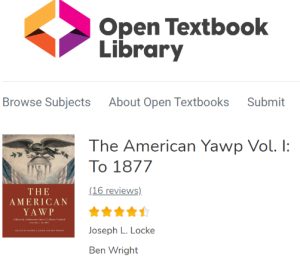What are Open Educational Resources (OER)?
In a time when food pantries are being utilized to help college students with food insecurities, OER have been
increasingly used in colleges and universities to help reduce or eliminate textbook costs to students. But what exactly are OER?
According to OERCommons.org, “Open Educational Resources (OER) are teaching and learning materials that are freely available online for everyone to use, whether you are an instructor, student or self-learner. Examples of OER include: full courses, course modules, syllabi, lectures, homework assignments, quizzes, lab and classroom activities, pedagogical materials, games, simulations, and many more resources contained in digital media collections from around the world.”
A common example of OER being used for a college course is an OER textbook. Faculty are often concerned with the quality of OER textbooks, but some OER textbooks are the exact same textbook that has been previously published in a traditional sense while others have been developed and peer-reviewed by educators. For example, The American Yawp (Vol. I) was developed by college-level instructors. Reviews by other college level history instructors and an easy way to suggest edits to the book are available for this OER textbook. If a faculty member wants to adopt this OER textbook, they have the option of using it in its entirety or changing it to fit their course (based on the licensing/conditions of use agreement).
True Open Educational Resources are freely available in at least one format, shareable with set copyright permissions, and often set up to be remixed/adapted to fit the user’s needs. However, if the overall goal is to reduce cost while using high quality resources, utilizing peer-reviewed articles accessible to MSU affiliated patrons (i.e. MSU students) through the library databases could be the way to meet pedagogical goals without adding to student costs. With the mosaic of affordable options available, finding what works well for each specific course is key.
There are several OER repositories such as OpenStax, Open Textbook Library, OER Commons, and Merlot to get you started with adoptable and/or adaptable OER. If it seems overwhelming, MSU has an OER librarian to help! Professor Tracy Stout can offer guidance and/or examples when trying to find OER for your courses. Similar to having a research consultation with a librarian, Tracy can work with those teaching courses who are interested in learning more about finding and utilizing OER. An OER library guide is also available for more information.